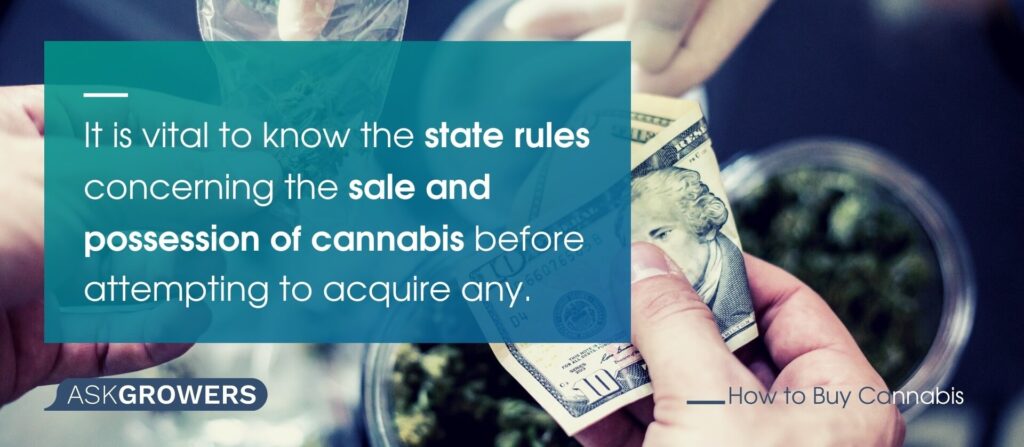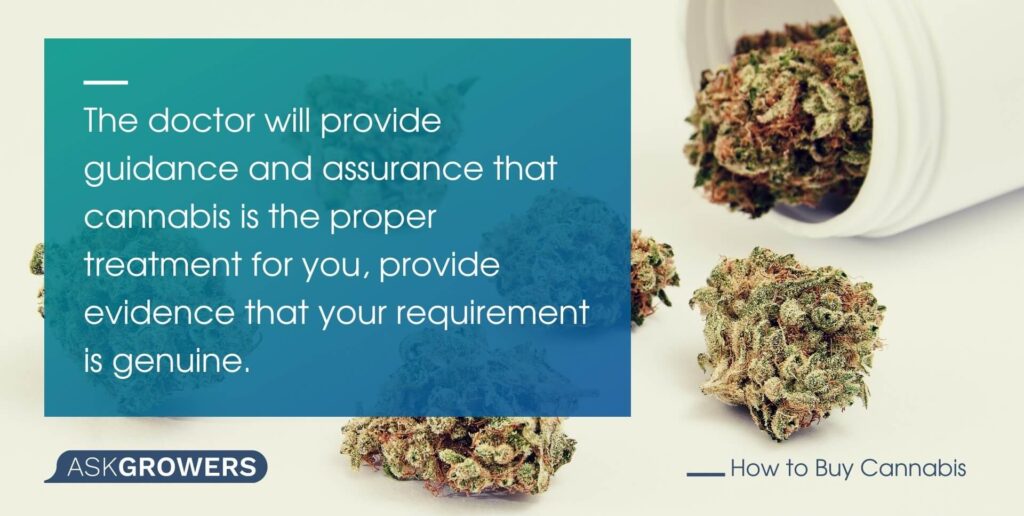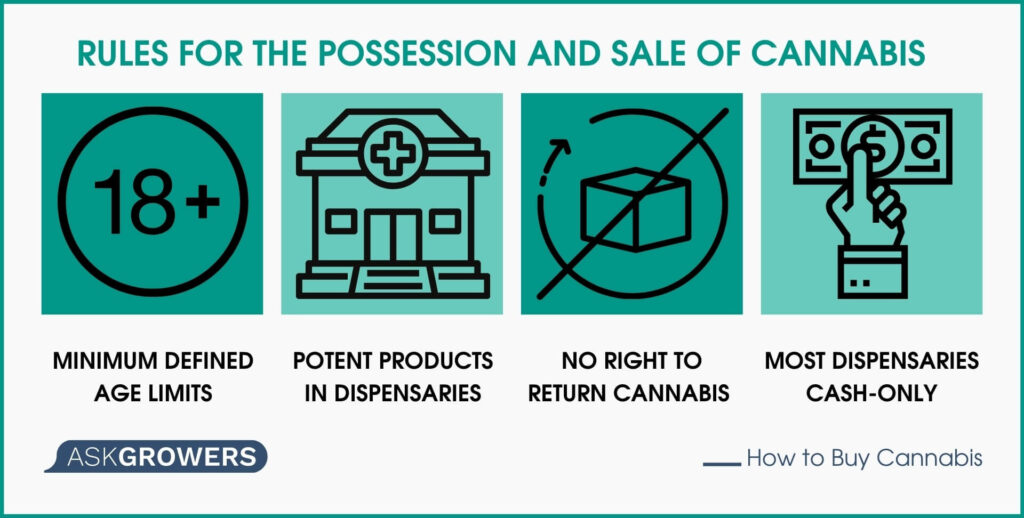Previously published on AskGrowers
Although it may seem strange to require a buying guide for any product in 2021 when that product is cannabis, it is well worth arming yourself with as much knowledge as possible. With so much nuance between state and federal laws regarding the purchase, possession, and consumption of marijuana, it is not always a simple process.
At the time of writing, cannabis is still a Schedule 1 substance, meaning that it is illegal to possess or consume for any reason under the Controlled Substances Act of 1970. The maximum penalty for possession is three years in prison and a $5,000 fine, while the sentence for sale can go as far as a life sentence and a million-dollar fine, so it is vital to be knowledgeable when buying weed.
However, state laws vary as 14 states, including California and Nevada, have legalized the recreational use of marijuana. A further 16 have decriminalized it, so it is possible to purchase and consume safely and legally.
While this may seem confusing, you can learn to understand it, which could be the key to a successful and fruitful purchase. The thing you need to do is read our guide to buying cannabis – we explain every significant aspect of purchasing cannabis products in detail. So, if you want to buy some weed but do not know where to start, read the info below carefully and consider it when making your first purchase.
Step 1: Know Your State Laws
This is the first and most important thing you need to do. But before we move to the state laws, let us clarify the situation regarding the federal laws.
There are two common cannabinoids, tetrahydrocannabinol and cannabidiol.
But what about state laws? The situation is different, so it is so important to read your state’s laws. Everyone knows that in California, both medical and recreational cannabis is legal. Does it mean that people can ignore federal laws? Essentially, no. Most stores face a lot of problems with banks – most banks are not going to violate federal laws.

In many states, cannabis is still wholly illegal and punishable to the full extent of federal law. This can also affect low THC level cannabis products, often known as non-psychoactive products, so it is vital to know the state rules concerning the sale and possession of cannabis before attempting to acquire any.
Below is a list of all the states and their legalization status, correct at the time of writing:
Alabama Non-psychoactive allowed for medical purposes, psychoactive illegal.
Alaska Legal for recreational and medicinal use.
Arizona Legal for recreational and medicinal use.
Arkansas Legal for medicinal use only.
California Legal for recreational and medicinal use. Colorado Legal for recreational and medicinal use.
Connecticut Decriminalized recreational use and legal for medicinal use.
Delaware Decriminalized recreational use and legal for medicinal use.
Florida Recreational use is illegal but legal for medical purposes.
Georgia Recreational use decriminalized in certain cities but illegal at the state level, medical use legal for under 5% THC, illegal above. Hawaii Decriminalized recreational use and legal, medical use.
Idaho Fully illegal for any purpose.
Illinois Legal for recreational and medical use.
Indiana Non-psychoactive legal for any use, psychoactive entirely illegal. Iowa Illegal, non-psychoactive allowed for medical purposes. Kansas Illegal, 0% THC allowed for any purpose.
Kentucky Illegal for recreational use, CBD oils allowed for medical use. Louisiana Illegal for recreational use, medical use allowed.
Maine Legal for recreational and medicinal use.
Maryland Decriminalized recreational use, legal for medical use. Massachusetts Legal for recreational and medicinal use. Michigan Legal for recreational and medicinal use.
Minnesota Decriminalized recreational use, legal for medicinal use.
Mississippi Decriminalized recreational use, legal for medicinal use.
Missouri Decriminalized recreational use, legal for medicinal use.
Montana Legal for recreational and medicinal use.
Nebraska Decriminalized for recreational use, illegal for medicinal use.
Nevada Legal for recreational and medicinal use.
New Hampshire Decriminalized recreational use, legal for medical use.
New Jersey Legal for recreational and medicinal use.
New Mexico Decriminalized recreational use, legal for medicinal use.
New York Decriminalized recreational use, legal for medicinal use.
North Carolina Decriminalized recreational use, CBD oil legal for medical use. North Dakota Decriminalized recreational use, legal for medicinal use.
Ohio Decriminalized recreational use, legal for medicinal use.
Oklahoma Illegal for recreational use, legal for medicinal use.
Oregon Legal for recreational and medicinal use.
Pennsylvania Illegal for recreational use, legal for medicinal use.
Rhode Island Decriminalized recreational use, legal for medicinal use.
South Carolina Illegal, CBD oil is allowed below 0.9% THC for medical use.
South Dakota Illegal for recreational use, legal for medicinal use.
Tennessee Illegal, CBD oil is allowed below 0.9% THC for medical use.
Texas Illegal, CBD oil over 10% CBD and under 0.5% THC allowed for medical use.
Utah Illegal for recreational use, legal for medicinal use.
Vermont Legal for recreational and medicinal use.
Virginia Decriminalized recreational use, legal for medical use.
Washington Legal for recreational and medicinal use.
West Virginia Illegal for recreational use, legal for medical use.
Wisconsin Illegal CBD oil is allowed for medical purposes.
Wyoming Illegal, CBD oil allowed for medical purposes.
Step 2: The Difference Between Dispensaries and Stores?
There are a few important differences to note between cannabis stores and cannabis dispensaries that you will need to be aware of when looking to acquire cannabis or weed for any purpose.
Dispensary
Typically, dispensaries deal with the distribution of medical marijuana and are unavailable for use by recreational weed buyers and consumers. Many dispensaries will require evidence that you have a legitimate medicinal requirement and are not looking to buy weed for recreational use and certainly not looking to acquire for others.

If you are looking to use a dispensary to fulfill a genuine medical need, then your doctor will be the first step on your journey. They will provide guidance and assurance that cannabis is the proper treatment for you, provide evidence that your requirement is genuine, and will be aware of state and federal laws regarding the acquisition, possession, and consumption of cannabis for medical use.
Store
If you are looking for recreational marijuana in states where recreational use is legal, then a weed store is the place to go. Many stores offer a wide range of weed products and brands, offering different THC and CBD concentrations for you to select alongside concentrates and edible marijuana products such as candies and chocolate bars.
There is a wealth of weed stores to choose from online if you prefer to purchase online, and many will offer free delivery on orders over a specific value and safe, secure, and discreet packaging to ensure that your product is up to the expected standard when you get your hands on it. Most of these online stores use payment services such as PayPal and Cash App, so it is important to be sure that you can trust the site before making a purchase.
You may also find that your local store has a website that you can browse before visiting and benefit from the best of both worlds, gaining an understanding of the store’s range before visiting and enjoying the comfort and security that face-to-face transactions offer. You will also benefit from the knowledge and understanding of the store owners and staff. As well as buying weed, stores will often present a social opportunity and a chance to enjoy some cannabis coffee or something similar while you browse.
Step 3: Understand and Remember the Universal Rules
Understanding state laws and the different places to buy marijuana safely and legally is fundamental. Still, that alone will not be enough if you do not understand the universal rules that are in place regarding the possession and sale of cannabis. It is important to note the following before buying weed:

- You must be an adult to purchase weed in any state. The minimum defined age limits are 21 for recreational use and 18 for medical marijuana. No amount of knowledge of how to buy weed will help you if you are underage.
- Many more potent products will only be available from dispensaries with a legitimate medical requirement.
- There is no right to return cannabis products, whether you purchase them from stores or dispensaries, so make sure your decision is informed as it will be final.
- Many stores and dispensaries deal only in cash as banks are reluctant to provide services for these products. This is due to the federal classification of cannabis as a Scheduled Substance and does not necessarily reflect your state’s local laws.
Step 4: Make the Right Choice of Product
The advice outlined in this guide, alongside the knowledge and understanding of local laws and regulations, will go a long way in helping you to be confident that your purchase is legal, but you still must get the right products. Legal marijuana is heavily regulated, and store owners, dispensary teams, and your doctor will be able to help you navigate the nuances to fit your own needs.
There are several different choices with regards to consumption methods, whether you are buying dried weed to roll up and smoke in joints or blunts, baking cannabis-infused goods, or using cannabis-infused vape liquids, there will likely be several different options available at any good store, with varying strength and consistency.
Vital Things to Remember
We hope this cannabis guide provides enough knowledge for you to be confident about how to buy cannabis and to understand the options available to you. Here are a few things that you really must always keep in mind when considering buying weed.
- Seek medical advice before attempting to purchase marijuana for medical purposes from a dispensary.
- Do your research and understand the range of products available at your local store or dispensary.
- Be prepared to prove your age, as underage sales or purchases are subject to severe penalties.
- Make sure to pick the right products. The highest THC content would not be suitable for first-time users, while lower THC on experienced users may be minimal.
- Bring cash, as many stores and dispensaries cannot use mainstream banking services due to federal laws.
- Enjoy responsibly. Cannabis is a psychoactive drug that can affect your behavior and reactions. Know your limits and never drive or operate heavy machinery while under the influence of marijuana.
Final Thoughts
This guide should arm you with an idea of what process to follow when buying cannabis. Still, we must stress how important it is to seek medical advice where applicable and ensure that you are purchasing legally from approved sellers. With harsh penalties, including mandatory minimum sentences in some states, it is crucial to understand the law.
© 2025 Benzinga.com. Benzinga does not provide investment advice. All rights reserved.
Trade confidently with insights and alerts from analyst ratings, free reports and breaking news that affects the stocks you care about.
Cannabis is evolving – don’t get left behind!
Curious about what’s next for the industry and how to leverage California’s unique market?
Join top executives, policymakers, and investors at the Benzinga Cannabis Market Spotlight in Anaheim, CA, at the House of Blues on November 12. Dive deep into the latest strategies, investment trends, and brand insights that are shaping the future of cannabis!
Get your tickets now to secure your spot and avoid last-minute price hikes.